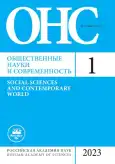The unsolved issue of arms control: anti-missile dilemma
- Authors: Mizin V.I.1
-
Affiliations:
- Primakov National Research Institute of World Economy and International Relations of the Russian Academy of Sciences
- Issue: No 1 (2023)
- Pages: 68-82
- Section: Articles
- URL: https://journals.eco-vector.com/0869-0499/article/view/675211
- DOI: https://doi.org/10.31857/S0869049923010057
- EDN: https://elibrary.ru/NPHGQN
- ID: 675211
Cite item
Abstract
The issue of missile defense (ABM) remains one of the key topics of the discussion on arms control at the present stage. Without its eventual forthcoming solution, it is impossible to further advance towards reducing the military threat on a global scale, and mutual reduction of the nuclear weapons capabilities of Russia and the United States, Russia and NATO, as well as to strengthen global strategic stability overall. At the same time, this issue is a serious irritant in Russia’s relations with its Western counterparts, and, above all, with the NATO military-political alliance led by the United States. Consequently, finding mutually acceptable solutions in this area would help restore trust between Russia and her counterparts and create prerequisites for moving towards a safer and more stable world. А number of tangible priority steps are suggested. Those measures might create certain ways out of the current negotiating impasse over the missile defense issue and help adopt pragmatic measures that would not violate the national security of any states. This process might take place in case of normalization of relations between Moscow and Washington.
About the authors
Victor I. Mizin
Primakov National Research Institute of World Economy and International Relations of the Russian Academy of Sciences
Email: vmizin@hotmail.com
Moscow, Russia
References
- Антонов А. И. (2012) Контроль над вооружениями: история, состояние, перспективы. М.: Российская политическая энциклопедия (РОССПЭН); ПИР-Центр. 132 с.
- Аничкина А.Б. Есин В.И. (2015) Дальнейшее сокращение стратегических ядерных вооружений России и США в контексте широкого понимания военно-стратегического баланса // Россия и Америка в XXI веке. № 2. С. 3.
- Арбатов А. Г. (2018) Угрозы стратегической стабильности - мнимые и реальные // Полис. Политические исследования. № 3. С. 7-29. (https://doi.org/10.17976/jpps/2018.03.02.)
- Дворкин В. (2012) Перспективы противоракетного сотрудничества США/НАТО и России // В: Противоракетная оборона: противостояние или сотрудничество? Ред.: Арбатов А., Дворкин В. М.: РОСПЭН. С. 192-211.
- Мизин В.И. (2019) Новые контуры стратегической стабильности и перспективы контроля над стратегическими вооружениями // Пути к миру и безопасности. № 1. С. 96-121. doi: 10.20542/2307-1494-2019-1-96-121.
- Мизин В.И. (2020) Новые контуры стратегической стабильности в глобальной многополярной конкуренции // Международные процессы. Т. 18. № 2. С. 141-168. doi: 10.17994/IT.2020.18.2.61.8. (http://www.intertrends.ru/system/Doc/ArticlePdf/1657/pxGpMC37T6.pdf).
- Brooks L.F. (2020) The End of Arms Control? // Daedalus. No. 149. Pp. 83-100. (https://www.amacad.org/sites/default/files/publication/downloads/Daedalus_Sp20_6_Brooks.pdf).
- Gottemoeller R. (2020) Rethinking Nuclear Arms Control // Washington Quarterly. Vol. 43. Issue 3. Pp. 139-159.
- Ivanov I. (2000) The Missile-Defense Mistake: Undermining Strategic Stability and the ABM Treaty // Foreign Affairs. Vol. 79. No. 5. Pp. 15-20.
- Lewis G., von Hippel F. (2018) Limitations on Ballistic Missile Defense - Past and Possibly Future // Bulletin of the Atomic Scientists. Vol. 74. No. 4. Pp. 199-209.
- Wilkening D.A. (2000) Ballistic-Missile Defence and Strategic Stability // The Adelphi Papers. Vol. 40. Issue 334. Pp. 5-8. doi: 10.4324/9781315001043.
Supplementary files











